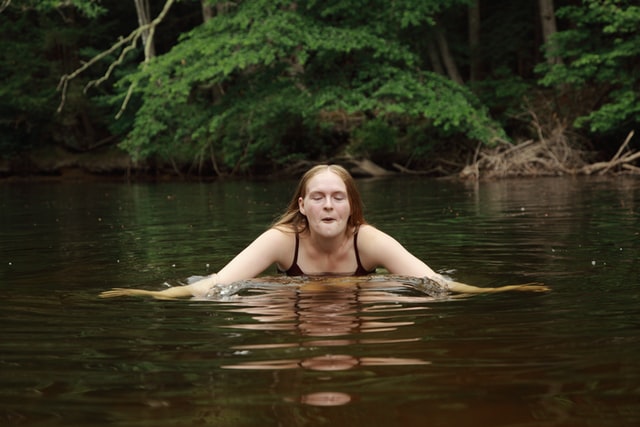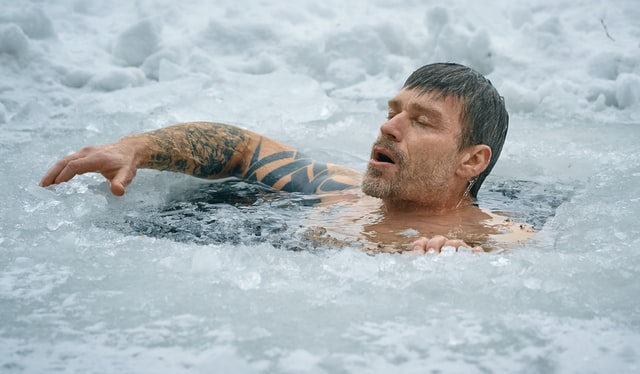Open Water Swimming: German Vocabulary Posted by Constanze on Jul 21, 2021 in Culture, Language, Sports
Guten Tag! Last week, we explored some swimming vocabulary, including the names of different areas of a swimming pool, and types of swimming (breast stroke, front crawl, etc.). This week, we’re taking it outdoors and exploring Freiwasserschwimmen (open water swimming) and the famous Wim Hof Method that involves Eisbaden (ice bathing)!
Wer ist Wim Hof? (Who is Wim Hof?)
Affectionately known as The Iceman, Wim Hof is an extreme athlete (der Extremsportler) from the Netherlands (die Niederlande). He holds several world records for swimming under ice and running barefoot half marathons in the snow, and is the founder of the Wim Hof Method – a combination of breathing techniques (die Atemtechnik), cold water immersion, and meditation, designed to strengthen the human immune system (das Immunsystem). Wim Hof is also famous for having climbed Mount Kilimanjaro (der Kilimandscharo) wearing nothing but shoes and a pair of shorts.
Perhaps as as result of the increased focus on immune system health, Wim Hof and his methods have grown in popularity over the past few years, with many people experimenting with his breathing techniques, trying out ice baths, or simply showering cold (kalt duschen) for 30 seconds at the end of their hot shower!
Das Freiwasserschwimmen – Open water swimming
While ice baths are something I have yet to pluck up the courage (der Mut) to do, I do like a bit of open water swimming (das Freiwasserschwimmen), especially when the water is very cold (sehr kalt)! There is something very refreshing (erfrischend) about this, and while there is an initial shock from the temperature (die Temperatur), you do feel amazing once you’re in the water!
While we’re here, let’s clear up some of the terms surrounding Freiwasserschwimmen, as it goes by several names in German:
das Freiwasserschwimmen – Open water swimming
das Kaltwasserschwimmen – Cold water swimming
das Eisschwimmen – Ice swimming
das Winterschwimmen – Winter swimming
Note that all the terms above involve the word schwimmen (swimming). Das Eisbaden (ice bathing) and das Winterbaden (winter bathing), on the other hand, are describing ‘taking a dip’, rather than actually swimming. This is what Wim Hof does when he immerses himself in an ice bath (das Eisbad).
The most obvious place to do any of the above activities is in the sea (das Meer). However, you could also partake in Freiwasserschwimmen/baden in a lake (der See), river (der Fluss), or stream (der Bach).
Check out this video of a man talking about, and then experiencing, an ice bath in a lake (in German). As a bonus, see if you can recognise any of the vocabulary from this post in it:
Cold water immersion is said to be good for overall health (die Gesundheit), in particular for the circulatory system (der Blutkreislauf). It is believed that practising some form of Kaltwasserschwimmen/baden will make you less sensitive to the cold (kälteempfindlich).
What’s your stance on Freiwasserschwimmen and Eisbaden? Have you tried any of Wim Hof’s methods for yourself? Leave me a comment in the comment box and let me know!
If you liked this post, you may also like this one: German swimming vocabulary
Vocabulary:
das Eisbaden – Ice bathing
das Winterbaden – Winter bathing
das Freiwasserschwimmen – Open water swimming
das Kaltwasserschwimmen – Cold water swimming
das Eisschwimmen – Ice swimming
das Winterschwimmen – Winter swimming
kalt duschen – To shower cold
der Extremsportler – Extreme athlete
das Eiswasser – Ice water
der Atem – Breath
die Atemtechnik – Breathing technique
die Meditation – Meditation
die Atemübungen – Breathing exercises
die Schnappatmung – Gasping (breath)
die Kälte – Cold
das Immunsystem – Immune system
die Gesundheit – Health
der Blutkreislauf – Blood circulation
kälteempfindlich – sensitive to cold
das Kältetraining – Cold training

Build vocabulary, practice pronunciation, and more with Transparent Language Online. Available anytime, anywhere, on any device.






